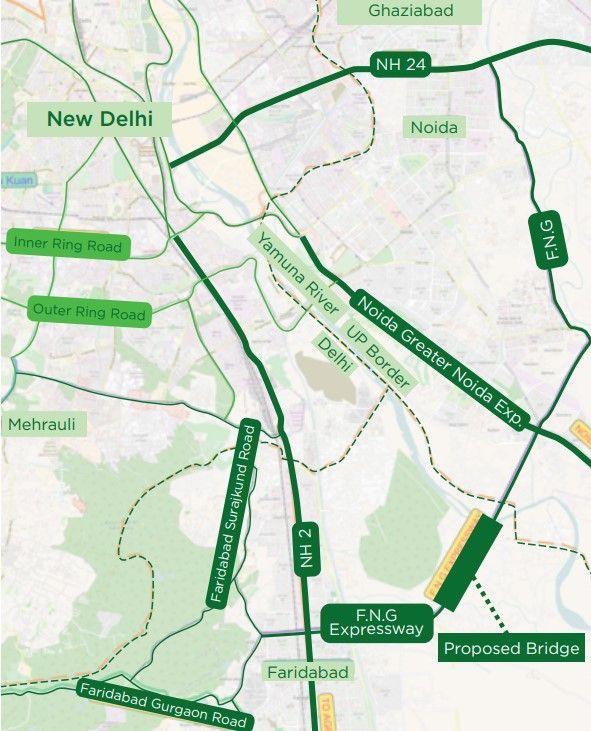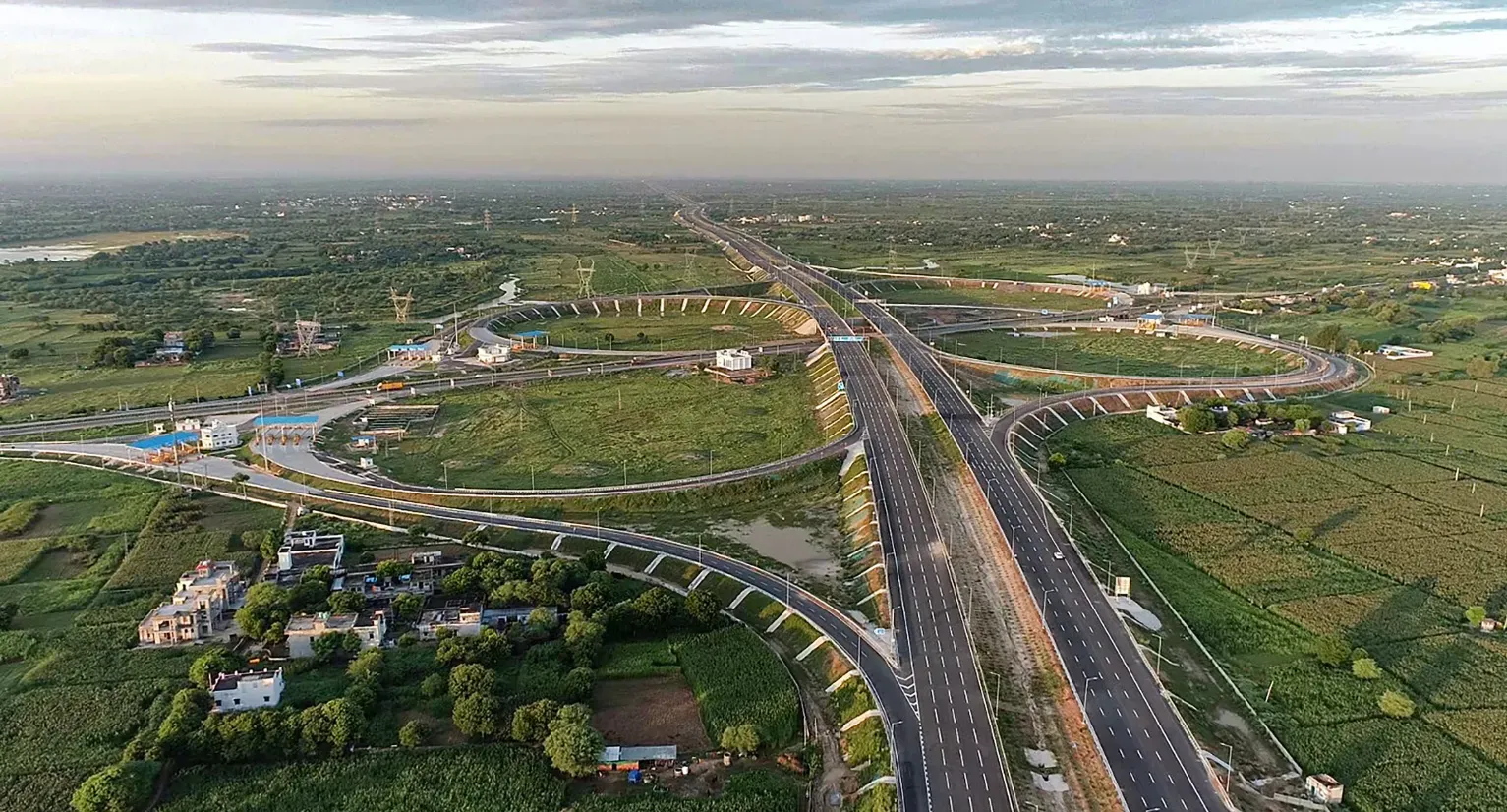Table of Content
▲- Introduction
- What is the FNG Expressway?
- FNG Expressway Map
- Route Details of the FNG Expressway
- Faridabad Section
- Noida Section
- Ghaziabad Section
- Key Features of the FNG Expressway
- Benefits of the FNG Expressway
- Real Estate Opportunities Along the FNG Expressway
- Challenges in the Development of FNG Expressway
- Conclusion
Introduction
The National Capital Region (NCR) of India has long been a hub of economic activity, attracting residents and businesses alike. As one of the fastest-growing regions in the country, it faces significant challenges in transportation and connectivity. The FNG Expressway (Faridabad-Noida-Ghaziabad Expressway) is a transformative infrastructure project aimed at addressing these issues by linking three critical cities—Faridabad, Noida, and Ghaziabad. With a length of approximately 56 kilometers, the FNG Expressway is expected to alleviate traffic congestion, reduce travel time, and act as a catalyst for real estate development across the NCR. This article will delve into the details of the FNG Expressway, its route, benefits, impact on real estate, and challenges it may face.
What is the FNG Expressway?
The FNG Expressway is a major arterial road designed to connect Faridabad, Noida, and Ghaziabad, three key cities within the NCR. Its construction has been long awaited due to the ever-increasing demand for better connectivity between these cities. Once fully operational, the expressway will provide a smooth and uninterrupted transit route for commuters and businesses, facilitating easier movement and quicker access across the NCR.
The expressway is not just about improving transportation—it is also a significant development for the economy, particularly for real estate, logistics, and industrial sectors. It is anticipated that the expressway will drive the growth of satellite townships and create new opportunities for businesses and investors.
FNG Expressway Map

Route Details of the FNG Expressway
The FNG Expressway covers a distance of 56 kilometers and passes through various urban and semi-urban areas in Faridabad, Noida, and Ghaziabad. Here's a detailed breakdown of the route:
Faridabad Section
- The FNG Expressway starts from the outskirts of Faridabad, particularly from the Badkhal area.
- This section of the expressway connects the industrial and residential areas of Faridabad, including the sectors around Surajkund, Green Valley, and Sector 12, 15, 16, and 21.
- The Faridabad stretch of the expressway ensures smoother access to Noida and Ghaziabad for Faridabad’s residents and businesses, significantly reducing travel time between the cities.
Noida Section
- The Noida section of the FNG Expressway spans approximately 20 kilometers. This part connects several key sectors, such as Noida Extension, Sector 73, Sector 78, and Sector 79.
- One of the major highlights is that the FNG Expressway runs parallel to the existing Noida-Greater Noida Expressway, providing an alternative route for commuters traveling between these areas.
- It intersects with major roadways, including Dadri Road and Noida-Greater Noida Expressway, allowing for convenient access to central Noida and commercial hubs.
Ghaziabad Section
- The expressway then proceeds to Ghaziabad, passing through residential and industrial areas such as Crossings Republik, Raj Nagar Extension, and Indirapuram.
- The final leg of the expressway ends at NH-24 (renamed as NH-9), which links Ghaziabad to other parts of Uttar Pradesh and Delhi.
- This section will drastically reduce the commuting time for Ghaziabad residents traveling to Noida and Faridabad and will ease congestion on the heavily trafficked NH-24.
Key Features of the FNG Expressway
- Length: Spanning approximately 56 kilometers, the expressway offers a direct connection between Faridabad, Noida, and Ghaziabad.
- Carriageways: The FNG Expressway will have a six-lane carriageway to accommodate heavy traffic, with provisions for expansion in the future.
- Flyovers and Underpasses: To ensure seamless connectivity, the expressway will feature multiple flyovers, underpasses, and interchanges at key junctions.
- Speed Limits and Safety: The expressway is designed for high-speed traffic, with a speed limit of around 100 km/h, depending on the section. Safety measures, including crash barriers, surveillance cameras, and pedestrian crossings, will be installed to reduce accidents.
Benefits of the FNG Expressway
The FNG Expressway is poised to bring significant benefits to the NCR, particularly in terms of connectivity, economic growth, and real estate development. Some of the key benefits include:
- Enhanced Connectivity
The most significant advantage of the FNG Expressway is its ability to enhance connectivity between Faridabad, Noida, and Ghaziabad. Currently, traveling between these cities often requires navigating through congested arterial roads and dealing with frequent traffic bottlenecks. The expressway will provide an uninterrupted link, reducing travel time and easing the strain on existing road networks.
- Reduction in Travel Time
Once operational, the FNG Expressway is expected to cut down travel times by 50% or more for commuters traveling between Faridabad, Noida, and Ghaziabad. This reduction in travel time will not only save fuel costs but also contribute to improved productivity and quality of life for commuters.
- Economic Growth
The expressway is expected to be a significant driver of economic growth in the NCR. The improved connectivity will make it easier for businesses to transport goods and services between the three cities, stimulating commerce and industry. Furthermore, the expressway will likely attract new investments in logistics, manufacturing, and IT, creating thousands of job opportunities in the region.
- Real Estate Development
The FNG Expressway is already having a significant impact on the real estate markets of Faridabad, Noida, and Ghaziabad. Areas along the expressway’s route are becoming hotbeds for real estate investment, with developers launching new residential and commercial projects to meet the anticipated demand. Property values in these areas are expected to rise, providing excellent opportunities for investors and homebuyers alike.
- Improved Infrastructure
In addition to the expressway itself, the construction of the FNG Expressway is leading to the development of associated infrastructure, including roads, bridges, and public utilities. This enhanced infrastructure will improve the overall quality of life in the areas surrounding the expressway and make them more attractive for both residents and businesses.
Real Estate Opportunities Along the FNG Expressway
The FNG Expressway is fast becoming a magnet for real estate development. With its potential to improve connectivity and accessibility, areas along the expressway are seeing a surge in demand for residential, commercial, and industrial properties.
- Noida Extension
Noida Extension, also known as Greater Noida West, is one of the biggest beneficiaries of the FNG Expressway. This area has been undergoing rapid development, with numerous housing projects catering to the needs of middle-income and upper-middle-income families. The improved connectivity to Faridabad and Ghaziabad will further boost the demand for properties in Noida Extension, making it one of the most sought-after real estate destinations in the NCR.
- Faridabad
Faridabad is another area that is set to benefit from the FNG Expressway. Sectors in Faridabad that are situated close to the expressway are witnessing increased interest from developers and investors. New residential and commercial projects are being launched in these sectors, catering to a growing demand for properties with easy access to Noida and Ghaziabad.
Also Read: YEIDA Plot Scheme 2024 | Know All About Yamuna Expressway Plot Schemes
- Ghaziabad
Ghaziabad, particularly areas such as Raj Nagar Extension and Crossings Republik, is also experiencing a real estate boom due to the FNG Expressway. These areas, which were previously limited by poor connectivity to other parts of the NCR, are now becoming more attractive to homebuyers and investors.
Challenges in the Development of FNG Expressway
Despite its numerous benefits, the development of the FNG Expressway has faced several challenges, including land acquisition issues, regulatory hurdles, and environmental concerns. Some of these challenges include:
- Land Acquisition
One of the biggest challenges in the construction of the FNG Expressway has been land acquisition. Acquiring land for the expressway has been a contentious issue, with landowners demanding higher compensation and better resettlement packages. Delays in land acquisition have slowed down the progress of the expressway’s construction in some areas.
- Environmental Concerns
The construction of the FNG Expressway has raised environmental concerns, particularly in areas where it passes through green belts and forested land. Environmental activists have raised objections to the destruction of natural habitats and the displacement of wildlife due to the construction of the expressway.
- Funding and Budget Constraints
The development of the FNG Expressway has faced financial challenges, with budgetary constraints and delays in funding allocations impacting the progress of construction. While the expressway is a priority project for both state and central governments, securing sufficient funds for its timely completion has been a challenge.
Conclusion
The FNG Expressway is set to transform the connectivity landscape of the NCR by providing a direct and efficient link between Faridabad, Noida, and Ghaziabad. With its potential to reduce travel times, ease traffic congestion, and boost economic growth, the expressway is poised to become a key driver of development in the region. Real estate markets in areas along the expressway are already benefiting from the improved connectivity, with property values expected to rise in the coming years.
While challenges remain in the completion of the FNG Expressway, the long-term benefits it promises to deliver to the NCR make it a vital project for the region's future growth. The expressway will not only enhance the quality of life for residents but also create new opportunities for businesses, investors, and developers. As the FNG Expressway inches closer to completion, its impact on the NCR's connectivity, economy, and real estate market will continue to grow.
Also Read: Delhi-Mumbai Expressway project to be completed by Oct 2025: Gadkari




_1771490516.webp)


Ans 1. The FNG Expressway (Faridabad-Noida-Ghaziabad Expressway) is a 56 km long arterial road that connects the cities of Faridabad, Noida, and Ghaziabad in the National Capital Region (NCR). Its purpose is to improve transportation and reduce travel time between these key cities.
Ans 2. The expressway features a six-lane carriageway, multiple flyovers, underpasses, interchanges at key junctions, and safety measures such as crash barriers and surveillance cameras. It is designed for high-speed traffic with a speed limit of around 100 km/h.
Ans 3. The expressway will significantly enhance connectivity, reduce travel time, alleviate traffic congestion, and stimulate economic growth. It will also drive real estate development in the areas surrounding the expressway.
Ans 4. The FNG Expressway starts from Faridabad, passes through Noida (Noida Extension, Sector 73, 78, etc.), and ends in Ghaziabad at NH-24. It provides a direct link between the three cities.
Ans 5. Areas along the expressway's route, particularly in Faridabad, Noida Extension, and Ghaziabad, are experiencing increased demand for residential and commercial properties. Property values in these areas are expected to rise due to improved connectivity.